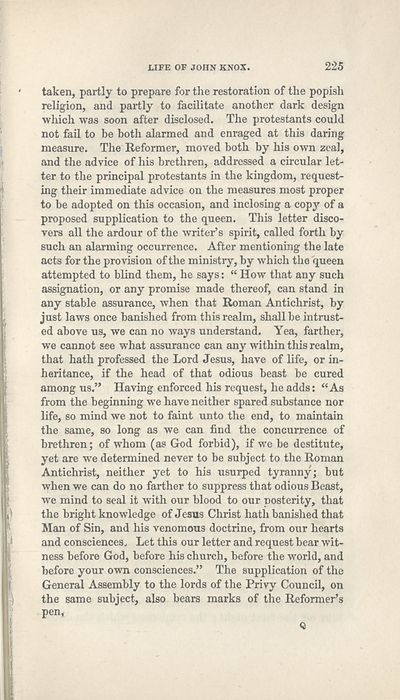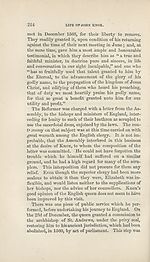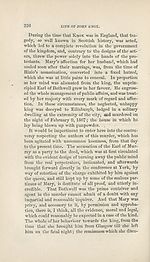Download files
Complete book:
Individual page:
Thumbnail gallery: Grid view | List view

LIFE OF JOHN KNOX.
225
taken, partly to prepare for the restoration of the popish
religion, and partly to facilitate another dark design
which was soon after disclosed. The protestants could
not fail to be both alarmed and enraged at this daring
measure. The Reformer, moved both by his own zeal,
and the advice of his brethren, addressed a circular let¬
ter to the principal protestants in the kingdom, request¬
ing their immediate advice on the measures most proper
to be adopted on this occasion, and inclosing a copy of a
proposed supplication to the queen. This letter disco¬
vers all the ardour of the writer’s spirit, called forth by
such an alarming occurrence. After mentioning the late
acts for the provision of the ministry, by which the queen
attempted to blind them, he says: “ How that any such
assignation, or any promise made thereof, can stand in
any stable assurance, when that Roman Antichrist, by
just laws once banished from this realm, shall be intrust¬
ed above us, we can no ways understand. Yea, farther,
we cannot see what assurance can any within this realm,
that hath professed the Lord Jesus, have of life, or in¬
heritance, if the head of that odious beast be cured
among us.” Having enforced his request, he adds: “As
from the beginning we have neither spared substance nor
life, so mind we not to faint unto the end, to maintain
the same, so long as we can find the concurrence of
brethren; of whom (as God forbid), if we be destitute,
yet are we determined never to be subject to the Roman
Antichrist, neither yet to his usurped tyranny; but
when we can do no farther to suppress that odious Beast,
we mind to seal it with our blood to our posterity, that
the bright knowledge of Jesus Christ hath banished that
Man of Sin, and his venomous doctrine, from our hearts
and consciences. Let this our letter and request bear wit¬
ness before God, before his church, before the world, and
before your own consciences.” The supplication of the
General Assembly to the lords of the Privy Council, on
the same subject, also bears marks of the Reformer’s
pen,
<S
225
taken, partly to prepare for the restoration of the popish
religion, and partly to facilitate another dark design
which was soon after disclosed. The protestants could
not fail to be both alarmed and enraged at this daring
measure. The Reformer, moved both by his own zeal,
and the advice of his brethren, addressed a circular let¬
ter to the principal protestants in the kingdom, request¬
ing their immediate advice on the measures most proper
to be adopted on this occasion, and inclosing a copy of a
proposed supplication to the queen. This letter disco¬
vers all the ardour of the writer’s spirit, called forth by
such an alarming occurrence. After mentioning the late
acts for the provision of the ministry, by which the queen
attempted to blind them, he says: “ How that any such
assignation, or any promise made thereof, can stand in
any stable assurance, when that Roman Antichrist, by
just laws once banished from this realm, shall be intrust¬
ed above us, we can no ways understand. Yea, farther,
we cannot see what assurance can any within this realm,
that hath professed the Lord Jesus, have of life, or in¬
heritance, if the head of that odious beast be cured
among us.” Having enforced his request, he adds: “As
from the beginning we have neither spared substance nor
life, so mind we not to faint unto the end, to maintain
the same, so long as we can find the concurrence of
brethren; of whom (as God forbid), if we be destitute,
yet are we determined never to be subject to the Roman
Antichrist, neither yet to his usurped tyranny; but
when we can do no farther to suppress that odious Beast,
we mind to seal it with our blood to our posterity, that
the bright knowledge of Jesus Christ hath banished that
Man of Sin, and his venomous doctrine, from our hearts
and consciences. Let this our letter and request bear wit¬
ness before God, before his church, before the world, and
before your own consciences.” The supplication of the
General Assembly to the lords of the Privy Council, on
the same subject, also bears marks of the Reformer’s
pen,
<S
Set display mode to:
![]() Universal Viewer |
Universal Viewer | ![]() Mirador |
Large image | Transcription
Mirador |
Large image | Transcription
| Antiquarian books of Scotland > Scotland/Scots > Life of John Knox ; and, The life of Alexander Henderson > (243) |
|---|
| Permanent URL | https://digital.nls.uk/131835220 |
|---|
| Description | Thousands of printed books from the Antiquarian Books of Scotland collection which dates from 1641 to the 1980s. The collection consists of 14,800 books which were published in Scotland or have a Scottish connection, e.g. through the author, printer or owner. Subjects covered include sport, education, diseases, adventure, occupations, Jacobites, politics and religion. Among the 29 languages represented are English, Gaelic, Italian, French, Russian and Swedish. |
|---|

